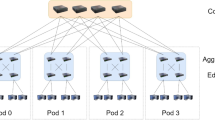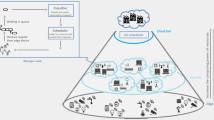Abstract
The presence of limitations such as processing and energy in many of end devices has resulted in task offloading to other sources. To address these limitations, offloading can be performed in diverse environments such as fog or cloud. This article reviews the multi-objective optimization of task offloading, which is a crucial challenge in fog computing. First, a task offloading model is presented for the simultaneous optimization of response time, energy consumption, and cost criteria, while considering availability criteria. This model utilizes a virtual controller to monitor all three layers of IoT, Fog, and Cloud. In the following, a developed version of the multi-objective crow search algorithm called the Improved Non-Dominated Sorting Crow Search Algorithm (INSCSA) is presented. An advantage of this research, compared to previous works, is the investigation of the optimality of the whole system. Evaluations demonstrate that our method has achieved superior results compared to the other methods.















Similar content being viewed by others
Data availability
Enquiries about data availability should be directed to the authors.
References
Mukherjee, M., Shu, L., Wang, D.: Survey of Fog computing: fundamental, network applications, and research challenges. IEEE Commun. Surv. Tutorials 20(3), 1826–1857 (2018)
Wang, S., Fan, C., Hsu, C.H., Sun, Q., Yang, F.: A Vertical handoff method via self-selection decision tree for internet of vehicles. IEEE Syst. J. 10(3), 1183–1192 (2016)
Zhou, A., Wang, S., Zheng, Z., Hsu, C.H., Lyu, M.R., Yang, F.: On cloud service reliability enhancement with optimal resource usage. IEEE Trans. Cloud Comput. 4(4), 452–466 (2016)
Y. **ao and M. Krunz, “QoE and power efficiency tradeoff for fog computing networks with fog node cooperation,” in IEEE INFOCOM 2017 - IEEE Conference on Computer Communications, 1–9 (2017)
Alameddine, H.A., Sharafeddine, S., Sebbah, S., Ayoubi, S., Assi, C.: Dynamic task offloading and scheduling for low-latency iot services in multi-access edge computing. IEEE J. Sel. Areas Commun. 37(3), 668–682 (2019)
Lan, Y., Wang, X., Wang, D., Liu, Z., Zhang, Y.: Task caching, offloading, and resource allocation in D2D-aided fog computing networks. IEEE Access 7, 104876–104891 (2019)
Deb, K., Deb, K.: Multi-objective optimization, in search methodologies, pp. 403–449. Springer, US, Boston, MA (2014)
P. Ngatchou, A. Zarei, and M. A. El-Sharkawi, “Pareto multi objective optimization,” in Proceedings of the 13th International Conference on Intelligent Systems Application to Power Systems, ISAP’05, 2005, vol. 2005, pp. 84–91
Abido, M.A.: A novel multiobjective evolutionary algorithm for environmental/economic power dispatch. Electr. Power Syst. Res. 65(1), 71–81 (2003)
L. Zitzler, Eckart; Deb, Kalyanmoy; Thiele, Comparison of multiobjective evolutionary algorithms: empirical results. 1–51 (2009)
A. M. Andrew, “ Introduction to Evolutionary Computing20042A.E. Eiben and J.E. Smith. Introduction to Evolutionary Computing . Berlin: Springer 2003. xv + 299 pp., ISBN: 3‐540‐40184‐9 hardback, £30.00 Natural Computing Series ,” Kybernetes, vol. 33, no. 5/6. 1064–1065 (2004)
Coello Coello, C.A.: A comprehensive survey of evolutionary-based multiobjective optimization techniques. Knowl. Inf. Syst. 1(3), 269–308 (1999)
Konak, A., Coit, D.W., Smith, A.E.: Multi-objective optimization using genetic algorithms: a tutorial. Reliab. Eng. Syst. Saf. 91(9), 992–1007 (2006)
V. De Maio and I. Brandic, “Multi-objective mobile edge provisioning in small cell clouds,” in ICPE 2019 - Proceedings of the 2019 ACM/SPEC International Conference on Performance Engineering, 127–138 (2019)
Wu, C., Li, W., Wang, L., Zomaya, A.Y.: An evolutionary fuzzy scheduler for multi-objective resource allocation in fog computing. Futur. Gener. Comput. Syst. 117, 498–509 (2021)
Akbar, A., Ibrar, M., Jan, M.A., Bashir, A.K., Wang, L.: SDN-Enabled adaptive and reliable communication in IoT-Fog environment using machine learning and multiobjective optimization. IEEE Internet Things J. 8(5), 3057–3065 (2021)
Cho, B., **ao, Y.: A repeated unknown game: decentralized task offloading in vehicular fog computing. IEEE Trans. Veh. Technol. (2023). https://doi.org/10.1109/TVT.2023.3275120
Nam, S., Kwak, S., Lee, J., Park, S.: Task offloading based on vehicular edge computing for autonomous platooning. Comput. Syst. Sci. Eng. 46(1), 659–670 (2023)
A. Bozorgchenani, D. Tarchi, and G. E. Corazza, “An Energy and Delay-Efficient Partial Offloading Technique for Fog Computing Architectures,” in 2017 IEEE Global Communications Conference, GLOBECOM 2017—Proceedings, 2018-Janua, 1–6 (2017)
Huang, B., et al.: Security modeling and efficient computation offloading for service workflow in mobile edge computing. Futur. Gener. Comput. Syst. 97, 755–774 (2019)
Adhikari, M., Mukherjee, M., Srirama, S.N.: DPTO: a deadline and priority-aware task offloading in fog computing framework leveraging multilevel feedback queueing. IEEE Internet Things J. 7(7), 5773–5782 (2020)
Xu, X., Gu, R., Dai, F., Qi, L., Wan, S.: Multi-objective computation offloading for Internet of Vehicles in cloud-edge computing. Wirel. Netw. 26(3), 1611–1629 (2020)
Keshavarznejad, M., Rezvani, M.H., Adabi, S.: Delay-aware optimization of energy consumption for task offloading in fog environments using metaheuristic algorithms. Cluster Comput. 24(3), 1825–1853 (2021)
Sun, H., Yu, H., Fan, G., Chen, L.: Energy and time efficient task offloading and resource allocation on the generic IoT-fog-cloud architecture. Peer-to-Peer Netw. Appl. 13(2), 548–563 (2020)
Liu, Y., Yu, F.R., Li, X., Ji, H., Leung, V.C.M.: Distributed resource allocation and computation offloading in fog and cloud networks with non-orthogonal multiple access. IEEE Trans. Veh. Technol. 67(12), 12137–12151 (2018)
Z. Chang, Z. Zhou, T. Ristaniemi, and Z. Niu, “Energy Efficient Optimization for Computation Offloading in Fog Computing System,” in 2017 IEEE Global Communications Conference, GLOBECOM 2017—Proceedings, 2018-Janua, 1–6 (2017)
Sun, J., Gu, Q., Zheng, T., Dong, P., Valera, A., Qin, Y.: Joint optimization of computation offloading and task scheduling in vehicular edge computing networks. IEEE Access 8, 10466–10477 (2020)
Mishra, K., Rajareddy, G.N.V., Ghugar, U., Chhabra, G.S., Gandomi, A.H.: A collaborative computation and offloading for compute-intensive and latency-sensitive dependency-aware tasks in dew-enabled vehicular fog computing: a federated deep q-learning approach. IEEE Trans. Netw. Serv. Manag. (2023). https://doi.org/10.1109/TNSM.2023.3282795
Han, Y., Li, X., Zhou, Z.: Dynamic task offloading and service migration optimization in edge networks. Int. J. Crowd Sci. 7(1), 16–23 (2023)
Abbas Khadir, A., Hosseini Seno, S.A., Fadhil Dhahir, B., Budiarto, R.: Efficient-cost task offloading scheme in fog-internet of vehicle networks. Comput. Syst. Sci. Eng. 45(2), 2223–2234 (2023)
Yu, Z., Zhao, Y., Deng, T., You, L., Yuan, D.: Less carbon footprint in edge computing by joint task offloading and energy sharing. IEEE Netw. Lett. (2023). https://doi.org/10.1109/LNET.2023.3286933
Liu, L., Chang, Z., Guo, X., Mao, S., Ristaniemi, T.: Multiobjective optimization for computation offloading in fog computing. IEEE Internet Things J. 5(1), 283–294 (2018)
Peng, K., et al.: An energy- and cost-aware computation offloading method for workflow applications in mobile edge computing. Eurasip J. Wirel. Commun. Netw. (2019). https://doi.org/10.1186/s13638-019-1526-x
De Maio, V., Kimovski, D.: Multi-objective scheduling of extreme data scientific workflows in Fog. Futur. Gener. Comput. Syst. 106, 171–184 (2020)
Khoobkar, M.H., Takht Fooladi, M.D., Rezvani, M.H., Gilanian Sadeghi, M.M.: Partial offloading with stable equilibrium in fog-cloud environments using replicator dynamics of evolutionary game theory”. Cluster Comput. 25(2), 1393–1420 (2022)
Zhou, S., Jadoon, W.: The partial computation offloading strategy based on game theory for multi-user in mobile edge computing environment. Comput. Netw. 178, 107334 (2020)
Shakarami, A., Shahidinejad, A., Ghobaei-Arani, M.: An autonomous computation offloading strategy in Mobile Edge Computing: a deep learning-based hybrid approach. J. Netw. Comput. Appl. 178, 102974 (2021)
Etemadi, M., Ghobaei-Arani, M., Shahidinejad, A.: Resource provisioning for IoT services in the fog computing environment: an autonomic approach. Comput. Commun. 161, 109–131 (2020)
D. Analysis and S. Nanocomposite, “From Cloud to Fog Computing: A Review and a Conceptual Live VM Migration Framework,” vol. 1, no. d. p. 2016, 2016
Besharati, R., Rezvani, M.H., Sadeghi, M.M.G.: An incentive-compatible offloading mechanism in fog-cloud environments using second-price sealed-bid auction. J. Grid Comput. 19(3), 37 (2021)
Askarzadeh, A.: A novel metaheuristic method for solving constrained engineering optimization problems: crow search algorithm. Comput. Struct. 169, 1–12 (2016)
Cheng, Q., Huang, H., Chen, M.: A novel crow search algorithm based on improved flower pollination. Math. Probl. Eng. 2021, 1–26 (2021)
Xu, Y., et al.: An enhanced differential evolution algorithm with a new oppositional-mutual learning strategy. Neurocomputing 435, 162–175 (2021)
Chakraborty, S.: TOPSIS and modified TOPSIS: a comparative analysis. Decis. Anal. J. 2, 100021 (2022)
A. A. Alli and M. M. Alam, “SecOFF-FCIoT: Machine learning based secure offloading in Fog-Cloud of things for smart city applications,” Internet of Things (Netherlands), vol. 7. (2019)
Subbaraj, S., Thiyagarajan, R., Rengaraj, M.: A smart fog computing based real-time secure resource allocation and scheduling strategy using multi-objective crow search algorithm. J. Ambient. Intell. Humaniz. Comput. 14(2), 1003–1015 (2023)
Sun, M., Xu, X., Tao, X., Zhang, P.: Large-scale user-assisted multi-task online offloading for latency reduction in D2D-enabled heterogeneous networks. IEEE Trans. Netw. Sci. Eng. 7(4), 2456–2467 (2020)
Funding
The authors have not disclosed any funding.
Author information
Authors and Affiliations
Contributions
Author Contributions Statement A. wrote the main manuscript text. B. C. made substantial contributions to the conception or design of the work. All authors reviewed the manuscript.
Corresponding author
Ethics declarations
Competing interest
The authors declare no competing interests.
Additional information
Publisher's Note
Springer Nature remains neutral with regard to jurisdictional claims in published maps and institutional affiliations.
Rights and permissions
Springer Nature or its licensor (e.g. a society or other partner) holds exclusive rights to this article under a publishing agreement with the author(s) or other rightsholder(s); author self-archiving of the accepted manuscript version of this article is solely governed by the terms of such publishing agreement and applicable law.
About this article
Cite this article
Fard, A.F., Ardakani, M.M. & Mirzaie, K. Multi-objective task offloading optimization in fog computing environment using INSCSA algorithm. Cluster Comput (2024). https://doi.org/10.1007/s10586-024-04311-y
Received:
Revised:
Accepted:
Published:
DOI: https://doi.org/10.1007/s10586-024-04311-y




